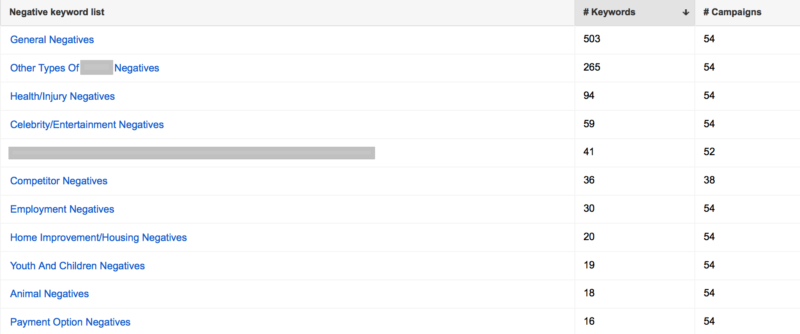How I Saved $1M Using Negative Keyword Lists
Is it worth it to use negative keyword lists? Columnist Carrie Albright shares her thoughts, plus an example that saved one client big-time.

When seeking opportunities for improved cost-efficiency, one of the most highly recommended checkpoints is the search term report in your paid search interface.
Discovering a keyword spending well beyond its CPL threshold results in a mix of joy (“Great! Another keyword to exclude!”) and pain (“How did this search term spend that much?”).
As your excluded terms accumulate, they inevitably grow into a massive list to be reviewed constantly for any chance of a mistake. Did you once exclude a term that, upon second glance, might need to be considered for an exact match negative but maybe not a broad match negative? With a list of more than 1,000 excluded terms, this type of quality check can be a huge time commitment and long-term undertaking.
Luckily, the PPC gods have released the Negative Keyword List for our excluding convenience. Now you can easily create smaller, more manageable groupings of negatives and apply them equally to whatever campaign is deserving.
But does the use of negative keyword lists really improve anything?
To answer that question, I’ve broken it down into three sub-questions for consideration:
1. Do Negative Keyword Lists Reduce Workload?
Yes.
After years of mining through search queries and haphazardly adding keywords that looked suspect or were clear offenders, the list became somewhat unmanageable. Worse yet, I started to forget what I’d added or why I added it.
Then negative keyword lists came along, and my neurotic little brain was happy again. I began poring over my negatives and sorting them into categories that made sense for my clients. Although there are some General Term lists that will apply to most of us, there are many, many more that are specific to each and every business.
Although the internet waters run deep with lists of “the 100 terms your PPC account should exclude” or “the beginner’s list to excluding keywords,” I find it much more beneficial to illustrate with examples than to tell you what works and what doesn’t.
Some sample categories of Negative Keyword Lists:
Employment (a common set of exclusions for the majority of accounts)
- career
- hiring
- application
- jobs
Terms Related to Your Own Industry
Example: Business Loans
- “interest free”
- “payday”
- “pay day”
- “start up”
Product names (cross-contamination)
Example: Shoe Retailer
- nike
- adidas
- converse
- reebok
Current Events
Example: Hospitality
- weather
- earthquake
- election
*Hot Tip: Creating a Google Alert for your client’s brand or industry will keep you looped into current events that may affect what prompts your ads to appear.
Branded Terms (For Non-Branded campaigns only)
Example: The Cheesecake Factory
- cheesecake
- cheese cake
- “cheesecake factory”
- “cheesecakefactory”
Upper Funnel Terms
Example: Travel industry
- “when to visit…”
- “arches national park”
- [moab]
- “things to do in…”
Converted Users
Example: Online retailer
- “confirmation number”
- login
- receipt
- return policy (Although you may want to verify that this is not being used as a successful comparison search query prior to excluding it)
These lists are not intended to fit you perfectly, but instead to compel you to look outside the “one list to rule them all” mentality and to specialize your categories. But there’s another logical question:
2. Do Negative Keyword Lists Improve Performance Transparency?
No.
While the Shared Library interface makes creating and implementing Negative Keyword lists simple and straightforward, there is one major hangup:
Negatives aren’t shown in the Google’s search term report.
The example below is a search query that has generated some interest:
What you can’t see in the interface is that the term “canine” has since been excluded and added to a negative keyword list. However, when we reflect on the search term report, it appears as though the term is still happily generating traffic. This kind of thing can create some confusion if you’re not prepared.
The secondary downfall to negative keyword lists is the inability to view them in the AdWords Editor. How many times have I gone to verify the addition of the negative term and panicked when it wasn’t present in the Editor? Too many to want to admit.
However, as I’ve gotten comfortable with using the negative lists, it’s a quick hop and jump into the Shared Library to search for said negative. But acclimating to this layout certainly did take a moment.
More than anything, the burning question we all have is this:
3. Do Negative Keyword Lists Actually Contribute To Improved Performance?
Maybe.
One client was able to make extremely detailed use of the negative keyword lists in both Google and Bing. The site was frequently affected by pop culture, celebrity news and new industry trends.
Without negative lists, we were almost running in circles with the lack of organization to our lists. We used (and continue to use) a few broad match modified keywords that frequently brought in great leads but also terribly irrelevant clicks, depending on the detail of the search term.
So we implemented some very distinct lists:
As more “pop culture” terms came through, we would simply add them to their appropriate list at the most effective match type.
This saved our team time and energy and allowed us to focus on the right kinds of optimizations, based on the right traffic. This process produced an overwhelming improvement to our performance.
Because we were more effectively showing the proper ads to our most relevant users, our click-through rate increased by 132 percent for the keywords in our account. While we saw an 8 percent decrease in conversion rate, the average cost per lead was cut in half.
Specifically, cost per lead plummeted by 53 percent, meaning the average cost per lead was 47 percent of the previous average. This not only allowed us to save $1.0M on overpriced leads, but we also were able to use budget that had previously been taken by these inefficiently covered search queries and invest it in top-performing campaigns and keywords.
Final Thoughts
Implementing negative keyword lists didn’t change the types of negative keywords we use, but it did alter how we manage our lists, how we approach negative keyword mining and what applies to our industry. And by taking advantage of this, we were able to focus our real attention on the account as a whole and ultimately improve overall performance.
Contributing authors are invited to create content for Search Engine Land and are chosen for their expertise and contribution to the search community. Our contributors work under the oversight of the editorial staff and contributions are checked for quality and relevance to our readers. The opinions they express are their own.
Related stories

